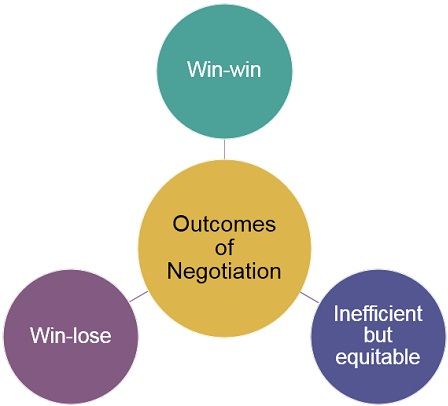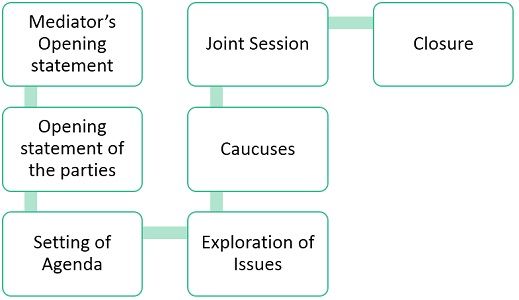 In many cases, parties under dispute look for an out-of-court settlement, by using Alternative Dispute Resolution (ADR) methods which are not just quick, but affordable too. One such method is mediation. It is an assisted negotiation in which a mediator is appointed by the parties concerned so as to listen to both the parties and assist them in finding a better solution.
In many cases, parties under dispute look for an out-of-court settlement, by using Alternative Dispute Resolution (ADR) methods which are not just quick, but affordable too. One such method is mediation. It is an assisted negotiation in which a mediator is appointed by the parties concerned so as to listen to both the parties and assist them in finding a better solution.
Now you must be wondering, what is negotiation? Negotiation is a process in which parties with conflicting interest come together to discuss and decide the outcome which can be adopted to manage and resolve the dispute.
What is Alternative Dispute Resolution (ADR)?
Alternative Dispute Resolution (ADR), as the name suggests, is a mechanism, wherein outside the court dispute settlement takes place between the parties. These are classified into statutory measures and non-statutory measures. One of the best things about ADR is that it is a private and confidential technique.
In this post, we will talk about the differences between mediation and negotiation.
Content: Negotiation Vs Mediation
Comparison Chart
| Basis for Comparison | Negotiation | Mediation |
|---|---|---|
| Meaning | Negotiation is a method of dispute resolution in which parties settle their conflict and reach an agreement through discussion. | Mediation is also a method of dispute resolution in which an independent third party assists the parties to conflict in resolving their disputes. |
| Intervention of third party | No | Yes |
| Meeting | Representatives of the parties to conflict meet to discuss their interests and rights. | A mediator meets both parties jointly and separately, to talk about the issue. |
| Representation of interest | By the parties themselves or by their representatives. | By the mediator |
| Settlement | Parties themselves reach an agreement. | The mediator proposes a solution, to resolve the issues of the parties concerned. |
| Outcome | Depends on the relationship between the group. | Controlled by the parties concerned |
Definition of Negotiation
Negotiation refers to a systematic process based on bipartite dialogue between parties in conflict that seek to reach a mutual agreement, by finding a win-win solution for both. Here, the term conflict does not mean quarrel, unrest, or disruption, rather it implies disagreement between parties concerning their interest and rights.
However, it requires compromise from both sides in order to be effective. And so both the parties must gain and lose something.
In the case of negotiation, the focus is made on the issue relating to the conflict, rather than the overall relationship. Moreover, the mutually settled agreement arrived at, by way of negotiation can be in the form of a treaty, code, or contract.
Negotiation arises when there are alternative outcomes of a situation, in which the parties in dispute are interested, however, there is a disagreement regarding the final outcome.
Example: Suppose you go to the market to buy some fruits, and you asked for the price of 1 kg grapes and the shopkeeper replied Rs. 120. Then you requested to sell those grapes at Rs. 100 per kg, but the shopkeeper negotiated and settled at Rs. 110 per kg. This process is called Negotiation.
Outcomes of Negotiation
There are three possible outcomes of negotiation:
- Win-win: Outcome in which both sides win
- Win-lose: Outcome in which one side wins while the other loses
- Inefficient but equitable: Outcome in which all the items are shared equally.
Also Read: Difference Between Collective Bargaining and Negotiation
Definition of Mediation
Mediation is an industrial dispute settlement system, which is non-binding in nature. In this method, an independent and unbiased third party is called in by the parties under dispute, to assist them in arriving at a solution that is mutually agreeable to both.
During mediation, the mediator appointed by the parties attempts to bring agreement between the parties concerned by initiating communication and offering multiple solutions, to the stand-off issue. Further, it creates such an environment that eases interaction between the parties.
Mediation is sought when:
- Parties are looking for a negotiated outcome.
- Maintain confidentiality
- Parties want to control the outcome.
- Quick settlement is required.
- Parties want to maintain and strengthen their relations in the future.
Also Read: Difference Between Mediation and Arbitration
Who is a Mediator?
Mediator refers to a professional and experienced outside party-appointed with an aim of dispute resolution. He/she must possess integrity, independence, and unbiasedness.
The role of a mediator is more like an advisor to the parties. This means that a mediator does not have decision-making power, rather he assists the parties to reach a settlement, by listening to the issue, suggesting solutions, communicating with and persuading the parties.
Therefore, whatever solution is proposed by the mediator in this regard, is not binding on the parties concerned, i.e. it is up to them, whether they want to adopt it or not.
Key Differences Between Negotiation and Mediation
Now as we have already talked about the basic concepts of the two terms, we will discuss the differences between negotiation and mediation:
- Negotiation is a method to resolve industrial disputes through self-counseling and discussion between the party members or the representatives of the parties, wherein a mutually acceptable agreement is sought. On the contrary, mediation is a non-statutory measure of dispute settlement, in which an independent third party is invited, to facilitate discussion, and suggest alternative solutions, to bring agreement.
- While negotiation does not involve the intervention of a neutral third party, in a mediation process, the mediator is invited or consent is given by both the parties to discuss the issue with the mediator, to bring about a suitable alternative solution.
- When it comes to meetings, representatives of the parties to conflict meet to put forward their interests, demands and talk about their rights. As against, in mediation, the mediator meets the parties to conflict both jointly and separately, to discuss the point of issue and suggest solutions.
- In the case of negotiation, interests are represented either by the party members themselves or by the representatives appointed by them. Conversely, in the case of mediation, a mediator represents the interests of the parties concerned.
- In negotiation, parties discuss and decide a possible outcome, which is acceptable to both, whereas in mediation, the mediator proposes a solution, to resolve the issues, but it is up to the parties, to adopt the same or not.
- When it comes to outcome, in a negotiation, the outcome is based on the relationship between the parties. In contrast, in mediation, the outcome is controlled by the parties to the conflict.
Similarities
- Voluntary, informal and systematic process
- Non-adversarial method
- Mutually acceptable outcome sought
Process of Mediation
The process of mediation involves seven important steps:
1. Mediator’s Opening statement
In the first stage, the mediator determines his neutrality and describes the process of mediation to both parties. Further, the parties are informed about the fact that whatever they state during the proceedings will remain confidential and won’t be disclosed even when they go to court for the purpose of settlement. The mediator needs to gain the trust and confidence of the parties by creating such an environment that can help in negotiation.
2. Opening statement of the parties
At this point, the parties will explain the case from their own perspective, along with their perception and interest.
3. Setting of Agenda
Thereafter, the setting of agenda takes place, wherein the mediator decides the sequence in which the negotiation will proceed so that the parties can evaluate the progress themselves.
4. Exploration of Issues
The mediator assists the parties in concentrating upon the issues and also exploring them further.
5. Caucuses
Also called a private session. In this stage, parties get an opportunity to put forward their side in front of the mediator one by one, separately. A mediator is not allowed to disclose the information given by one party to another party during the proceeding.
6. Joint Session
Once the private session is over, a joint session is convened, so as to move the parties to an agreement by providing an alternative solution. In case if there is no consensus between the parties, a private session may be organized to avoid a deadlock situation.
7. Closure
Once the parties agree to the terms of each other, a voluntary settlement between them is reached to settle the dispute.
Also Read: Difference Between Mediation and Conciliation
Process of Negotiation
The process of negotiation involves three main steps:
1. Identification of the problem
Different issues be it related to wages, additional economic benefits, institution, and administration are being identified. The nature of issues affects the entire negotiation process, including the selection of representatives, period of negotiation, etc.
2. Preparation of Negotiation
At this stage, both the parties prepare in advance the multiple issues to be discussed during negotiation, and representatives are selected for carrying out the negotiation.
3. Negotiation
For this purpose, a chief negotiator is appointed who presents the issue under consideration. Thereafter, the representative of both the side put forward their initial demands and also present their views. during the course of the procedure, the representatives must focus on understanding what are the purposes of the other side, so that they can present the counterarguments. This continues till a final settlement is reached.
Also Read: Difference Between Distributive and Integrative Negotiation
Conclusion
To sum up, we can say that the parties in conflict can choose any ADR method to resolve their dispute, without going to court. In both the two methods discussed above, the parties can control the outcome, considering their interest and preferences.






PARVEEN K.JAIN says
Very good presentation that is learning by comparison.
PARVEEN K.JAIN says
Very excellent
Sone Etoke says
Excellent presentation
Moses says
Nice presentation
Juvenal says
The topic it’s clearly and type of language used it’s also clearly to anyone who has interested to ready
Sanjeev Kumar says
Clear and Concise